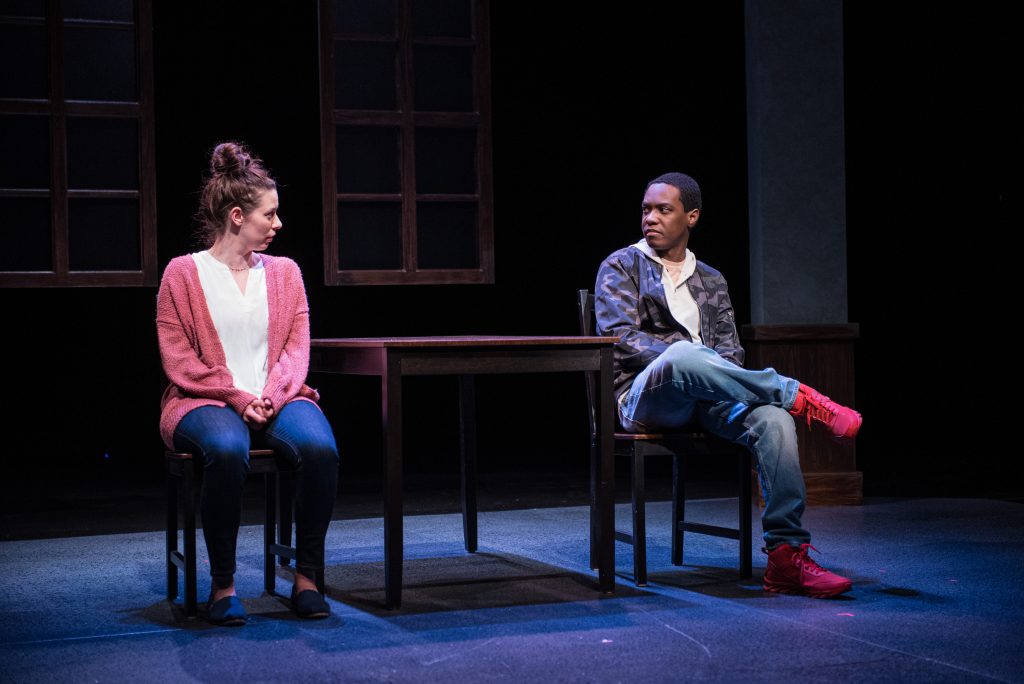What I Hear You Saying Is…
Renaissance production of ‘Actually’ looks at sex and consent for university students with thought-provoking play.
Two 18-year-old, first-year students at Princeton – one a white Jewish girl, the other a Black man — get drunk and have sex, though at a sexual conduct hearing their versions split apart in the blame game.
Anna Ziegler wrote this play in the heat of not only the #MeToo movement but the height of academic disputes trying to resolve conflicts on a range of issues the young people, the administrators and even twisting Title 9 rules barely comprehended – consent, date rape, racial conflicts, the hookup culture, drugs and body self-revulsion. It is a world in which special meaning applies to the words “no,” “maybe” and Actually, as Ziegler titled her play, being presented through April 3 by Renaissance Theaterworks at the company’s new home at Next Act Theatre.
Some of the dialogue “reveals” are obvious, but seldom heard aloud, such as young women questioning everything they eat and comparing their bodies to their friend’s or admitting to sexual attraction while the men are more open about the attraction as well as the aggression. The terms can be graphic and very human, but both sides are confused about what the other is actually saying.
Tightly directed by Mary MacDonald Kerr (who moves the conversations along smartly, using a few square tables and seating areas for the duo to move around in conjunction with their revelations), the drama takes on a stream-of-consciousness format, with the characters interrupting each other. The dialogue is not necessarily connected but linked by jumps in logic, one exchange leading to another.
While the play is generally fascinating, that’s sometimes only in an intellectual way. The play weaves in and out of our attention with moments where we just try to understand the sometimes-crass motives involved and other times the players explode with lively recriminations.
Playing fair in this case is not totally fair. Amber is an admitted chatterbox whose frightening honesty produces laughter as well as recognition in some of Ziegler’s best stretches of dialogue. She is brightly played by Eva Nimmer, who makes an emotional moment out of every messing with her hair or twisting her body to explain herself.
As Tom, Preston Tate, Jr. has to deal more actively with the playwright’s attempts (often successful) to get inside the mind of a young Black man just finding his way in life and knowing he is attractive to women at a predominantly white institution. The actor is clearly supposed to be the less verbal character; it is harder for him to open up, so he reveals a lot by talking about family and friends. Tate, Jr. smoothly handles Ziegler’s visions, but the lines remain more the playwright’s insights than his own. This is a play that works best when it emotionally grabs you, but often the grabbing feels like a mind game.
Dominique Paul Noth served for decades as film and drama critic, later senior editor for features at the Milwaukee Journal. You’ll find his blog here and here.
Review
-
Eating Burmese in Bay View
 Dec 13th, 2025 by Cari Taylor-Carlson
Dec 13th, 2025 by Cari Taylor-Carlson
-
Casablanca Is a Milwaukee Success
 Nov 30th, 2025 by Cari Taylor-Carlson
Nov 30th, 2025 by Cari Taylor-Carlson
-
Oh, Those Witty 18th Century Brits
 Nov 24th, 2025 by Dominique Paul Noth
Nov 24th, 2025 by Dominique Paul Noth
Theater
-
Oh, Those Witty 18th Century Brits
 Nov 24th, 2025 by Dominique Paul Noth
Nov 24th, 2025 by Dominique Paul Noth
-
Skylight’s Holiday Show Is Lots of Fun
 Nov 16th, 2025 by Dominique Paul Noth
Nov 16th, 2025 by Dominique Paul Noth
-
Rep’s ‘Come From Away’ Is a Triumph
 Nov 10th, 2025 by Dominique Paul Noth
Nov 10th, 2025 by Dominique Paul Noth




















